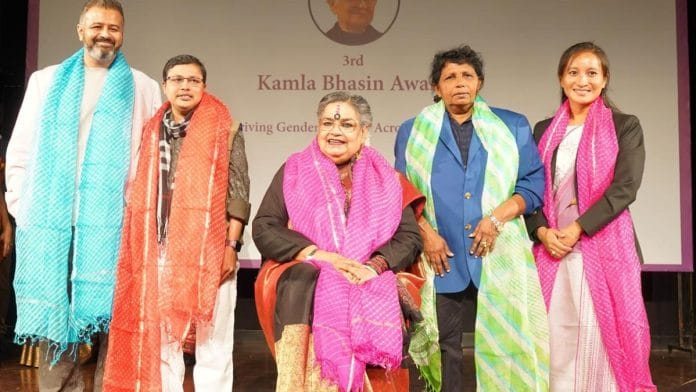New Delhi: The legacy of feminist icon Kamla Bhasin was kept aglow on a cold Friday evening in Lutyens Delhi, as a group of activists and social workers came to celebrate the Kamla Bhasin Awards for Driving Gender Equality Across South Asia.
The awards, presented on Saturday, 30 November, honour the work of extraordinary individuals across South Asia who have dedicated their lives to working toward gender equality at India International Centre. This year’s winners span Sri Lanka, Bangladesh and India, honouring both men and women across diverse fields — from a trade unionist fighting for working women to an athlete who rose above gender discrimination to become the only FIFA accredited football referee in her country.
Bhasin was known to say that she’s not a wall that divides — she’s a crack in that wall. And the opening remarks by the team behind the awards paid homage to the fact that walls can become bridges across borders.
“We’re here to celebrate all the things Kamla celebrated — the power of love and equality, which still has resonance across South Asia,” said Meenu Vadera, Founding Member, Azad Foundation, which gave the award with iPartner India and National Foundation for India. “And we need to have our own ‘sheroes’ to celebrate.”
The Rs 1 lakh award has two categories: for a woman (cis or trans) practicing a non-traditional livelihood, and for a man (cis or trans) working toward enabling a gender-just ecosystem.
The first category was won by Sri Lankan trade unionist Lalitha Ranjani, who leads the largest female trade union for garment workers in the country, and the second category went to Sunil Mohan from India, a trans man and former captain of the Kerala women’s cricket team who’s been advocating for trans rights over two decades. The special jury citation in the first category went to athlete Jaya Chakma from Bangladesh and to podcaster and CEO of Yuvaa Nikhil Taneja from India in the second category.
All the awardees were being recognised at this scale for the first time in their careers.
“This award goes to all my comrades, the working women of Sri Lanka for all they do,” said Ranjani via her Sinhala translator, holding back tears as she accepted the award. “It took me decades to get to where I am, given the male-dominated patriarchal society I live in. But I’m happy that the Kamla Bhasin award recognises our work in the region, even if Sri Lanka hasn’t yet.”
Breaking barriers
Winning the jury citation for the award was a moment that came full circle for Chakma, a football coach and the first and only FIFA-accredited referee in Bangladesh.
“I was once sexually harassed while wearing my jersey. It was one of the worst moments of my life,” said Chakma while accepting her award. “I went home that day and a Kamla Bhasin interview was on TV — listening to her changed my mind. It was then that I realised it wasn’t my fault that I was harassed,” she said.
The moment strengthened her resolve toward her work: guiding the youth to rise above challenges.
As a female athlete who comes from a marginalised tribe, Chakma talked of all the barriers she had to break through to be taken seriously. Sports is not just about physical fitness but mental fitness, she said — and it taught her the important life lesson of always returning to the field and never giving up.
A pioneer for Bangladeshi sportswomen, Chakma is now a coach at the Bangladesh Krira Shikkha Protishtan and has led her teams to multiple victories.
“This award gives me courage and confidence,” said Chakma. “I want to encourage young girls to pursue sports and their dreams — despite the instability in the sports world. We are no less than men,” she said.
Mohan, who was also an athlete and captaining the Kerala women’s cricket team, talked about the importance of engaging with regressive societal thought in order to help everyone move forward.
“Even though section 377 is gone, society hasn’t changed,” said Mohan while accepting his award. “This award is dedicated to all my friends who’ve left me — they might not be here anymore, but I still carry them with me. I will never leave my community alone without support,” he said.
Also read: Narayani Gupta preserved Delhi history for decades. For scholars, she’s ‘God sent’
Celebrating the region
Ranjani was overwhelmed at the attention: the diminutive leader doesn’t immediately give the impression that she leads a trade union with 1,500 working women.
Yet she’s worked tirelessly for over 30 years to organise workers in the garment industry under the Textile Garment and Clothing Workers Union. Often the only woman in the room, Ranjani has had to start from scratch to have other trade unionists understand the importance of fighting for the rights of working women.
“I did not even know what my rights were when I started organising workers,” said Ranjani on how far she’s come. “I want to continue my work educating and organising women — it’s important to fight this battle legally and socially, and make sure that our labour rights are protected.”
Coming from an agricultural background in rural Sri Lanka, Ranjani talked of her difficult childhood and the economic hardships her parents faced. It sharpened her determination to help women fight exploitation: with the support of her parents and “strong-willed women” around her, she established her union which has now grown to be the largest female-led union in the country.
“I’m especially happy to receive international recognition with the Kamla Bhasin award,” she said, thanking the organisers. “It gives me the strength to continue my work.”
(Edited by Ratan Priya)






